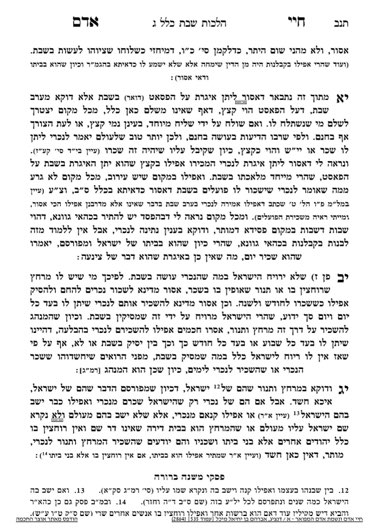We are continuing in siman 11, discussing mail on Shabbos. We have discussed sending mail on Shabbos; today we will discuss receiving mail.
- If the non-Jew knocks on the door and wishes to hand-deliver the mail, it is preferable to have the non-Jew put it down. The reason is due to the possibility that there was hotza’ah involved in the non-Jew bringing the mail to the door, and by the Jew accepting it, the Jew is completing the melacha. If it is inside of an eruv, one could argue that there is no issue.
- Sometimes the item requires a signature. The Jew cannot sign, obviously, but can tell the non-Jew that he cannot sign even though the non-Jew will sign it himself. The non-Jew signing is not a problem, because he is not signing for the Jew, but for himself–in order that he has the record of the delivery.
- It used to be that certain types of letters, known as areograms, were written on the envelope, with the writing folded into it in order to create an envelope. Opening the areogram makes the item useable, so it is kriah letzorech tikkun (destruction for the purpose of completing the item) and is assur deoraysa. However, a regular letter, in which the envelope is thrown away, is considered assur derabanan. Therefore, in a case of necessity (a loss, etc.), one could ask a non-Jew to open the letter. However, the leniency regarding opening envelopes is debatable.
- If the non-Jew will open the letter in a way which will make the envelope useful, we will again have the problem of kilkul letzorech tikkun. If the Jew tells the non-Jew not to open the letter, and he does so on his own volition, there is no problem.
- If the non-Jew did melacha for the benefit of the Jew, Chazal consider the item assur to use, and once it is assur to use, it becomes muktzah. An item which comes from outside of the techum on Shabbos is an exception, in that it is assur to use, but not assur to move.
- In siman 515, the poskim discuss a situation in which it would be muttar to even use an object which arrived from outside the techum on Shabbos. If one Jew sends an item to another Jew from outside the techum, one is allowed to use the object and benefit from it. Chazal prohibited using an item out of concern that one will ask the non-Jew to do something assur in relation to the item. If someone else sent the item, we do not have that concern.
- An item which was brought from outside the techum has a limitation that it cannot be moved past four amos, unless it is in a home or an eruv. This is not relevant to Shabbos, because without an eruv it cannot be moved either way, but is applicable on Yom Tov.
- Regarding receiving mail, if the contents of the mail are muktzah, the mail should not be touched, as it is muktzah.
- If it is not muktzah, it is preferable for the Jew not to receive the item in his hands. If there is an eruv, arguably it is muttar to receive it in his hands.
- If the item requires a signature, one may tell the non-Jew that he cannot sign, even though the non-Jew will sign for him.
- If the envelope is not opened in a way which makes it useful, and there is a significant need on the part of the Jew, one can ask the non-Jew to open a letter.
- Items which come from outside of the techum can be handled (i.e, moved) within a reshus hayachid, but one cannot benefit from its contents. If someone else ordered the items be brought, the recipient can even benefit from the contents.
- When opening the package is permitted, and when not, will be discussed separately.



